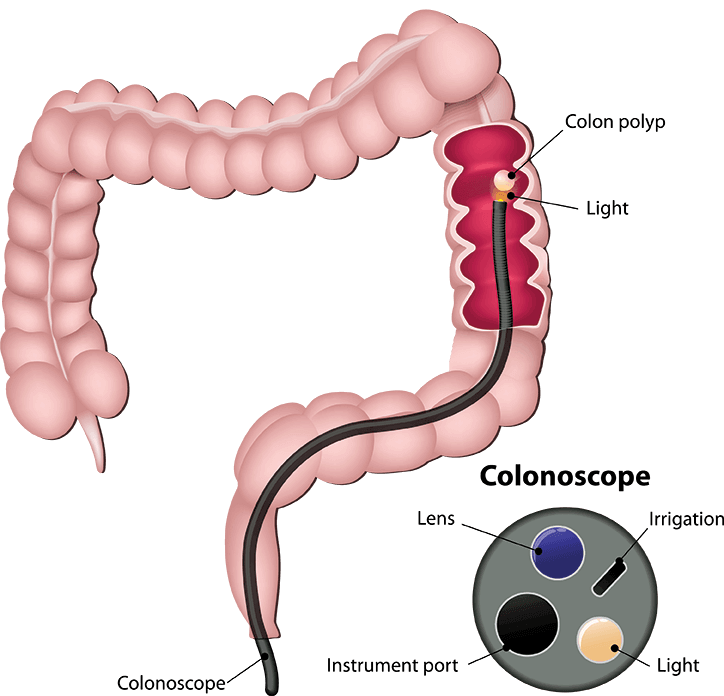colonoscopy
what is a
colonoscopy?

Colonoscopy is a procedure which uses a tube-like camera to examine or inspect the bowel and allows for a variety of operations to be carried out through the colonoscope.
This procedure may include taking small tissue samples (biopsies) and removal of polyps. Less accurate methods of examining the large bowel is barium enema or CT scanning. Colonoscopy has the advantage over radiological imaging for allowing tissue samples such as biopsies to be taken or polyps to be removed.
Prior to the colonoscopy you will be provided with full instructions. You can download a copy of the preparation below. The day before your procedure you will need to be on clear fluids only throughout the day. On either the evening before and/or the morning of the procedure you will need to drink a quantity of salty tasting solution which completely cleanses the colon. Some people find the prep quite unpleasant and it may cause nausea, vomiting and abdominal pains. If you have any symptoms which concern you while drinking the prep, please phone the Endoscopy Unit where you are having the procedure.
You will be given a sedative through a vein in the arm or hand before the procedure to make you more comfortable.
As drugs are used, and x-ray screening is occasionally used during or following the procedure, it is essential for female patients that there is no possibility of pregnancy. You must advise the nursing staff if you have any doubts about this.
You should advise the nursing staff if you are sensitive (allergic) to any drug or other substance.
You should cease iron tablets and drugs to stop diarrhea at least seven days before the procedure. Please do not stop any blood thinners or anti-coagulants unless directly advised to by your doctor. If you are on anticoagulants/antiplatelet drugs (blood- thinning drugs) you should discuss this with your doctor prior to signing the consent form. You should also inform your doctor if you have heart valve disease or have a pacemaker implanted.
The colonoscope is a long and highly flexible tube about the thickness of your index finger. It is inserted through the rectum into the large intestine to allow inspection of the whole large bowel. As cancer of the large bowel arises from pre-existing polyps (a benign wart-like growth), it is advisable that if any polyps are found they should be removed at the time of examination. Most polyps can be burnt off (polypectomy) by placing a wire snare around the base and applying an electric current.
For inspection of the bowel alone, complications of colonoscopy are uncommon. Most surveys report complications in 1 in 1,000 examinations or less. Complications which can occur include an intolerance of the bowel preparation solution or reaction to sedatives used. Perforation (making a hole in the bowel) or major bleeding from the bowel is extremely rare but if it occurs, may require surgery.
When operations such as removal of polyps are carried out at the time of examination there is a slightly higher risk of perforation or bleeding from the site where the polyp has been removed.
Complications of sedation are uncommon and are usually avoided by administering oxygen during the procedure and monitoring oxygen levels in the blood. Rarely however, in patients with severe cardiac or chest disease serious sedation reactions can occur.
A number of rare side effects can occur with any endoscopic procedure. Death is a remote possibility with any interventional procedure. If you wish to have full details or rare complications discussed, you should indicate to your doctor before the procedure that you wish for all possible complications to be fully discussed.
Because of the risk of cancer, it is recommended that all polyps found at the time of colonoscopy be removed. However, it will not be possible to discuss the removal with you at the time of examination as you will be sedated. Therefore, if you agree to having removed any polyps found during the procedure, please sign the consent form. If you have any queries or reservations about this, please inform your doctor.
In the unlikely event of haemorrhage occurring, blood transfusion may be necessary.
The sedative painkiller you are given before the procedure is very effective in reducing any discomfort. However, it may also affect your memory for some time afterwards. Even when the sedative appears to have worn off, you may find you are unable to recall details of your discussion with the doctor. For this reason, a relative or friend should come with you if possible. If you do not recall discussions following the procedure, you should contact your doctor.
If you have any severe abdominal pain, bleeding from the back passage, fever or other symptoms that cause you concern, you should contact your doctor immediately.
